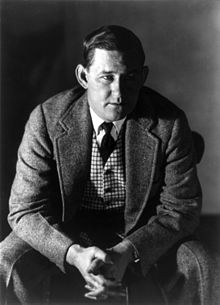John O'Hara
| John O'Hara | |
|---|---|

O'Hara in 1945
|
|
| Born |
January 31, 1905 Pottsville, Pennsylvania, United States |
| Died | April 11, 1970 (aged 65) Princeton, New Jersey, US |
| Occupation | Writer |
| Nationality | American |
| Genre | novel, short story, drama, script, essay |
John Henry O'Hara (January 31, 1905 – April 11, 1970) was an American writer. He first earned a reputation for short stories and later became a best-selling novelist before the age of thirty with Appointment in Samarra and BUtterfield 8.
O'Hara was a keen observer of social status, manners and class differences in early to mid 20th century America. Perhaps the most popular serious author of his time, he was pre-eminent among his contemporaries at depicting social, including sexual, realism. "O’Hara may not have been the best story writer of the twentieth century, but he is the most addictive," wrote Loren Stein, editor in chief of the Paris Review, in a 2013 appreciation of O'Hara's work, adding, "You can binge on his collections the way some people binge on Mad Men, and for some of the same reasons. On the topics of class, sex, and alcohol—that is, the topics that mattered to him—his novels amount to a secret history of American life." While O'Hara's legacy as a writer is mixed, his champions rank him among the most underappreciated and unjustly neglected major American writers of the twentieth century. Ironically, few college students educated after O'Hara's death in 1970 have discovered him because he refused to allow his work to be reprinted in anthologies used to teach literature at a college level. His reputation as a writer was also damaged by the detractors he accumulated due to his outsized and easily bruised ego, alcoholic crankiness, long held resentments and his focus on social ephemera, all of which at times overshadowed his gift for story telling. John Updike, a fan of O'Hara's writing, said that the prolific author "outproduced our capacity for appreciation; maybe now we can settle down and marvel at him all over again."
O'Hara was born in Pottsville, Pennsylvania to an affluent Irish American family. Though his family lived among the gentry of eastern Pennsylvania during his childhood, O'Hara's Irish Catholic background gave him the perspective on an outsider on the inside of polite WASP society, a theme he returned to in his writing again and again. He attended the secondary school Niagara Prep in Lewiston, New York, where he was named Class Poet for Class of 1924. His father died about that time, leaving him unable to afford Yale, the college of his dreams. By all accounts, this fall in social status from a privileged life of a well heeled doctor's family (including club memberships, riding and dance lessons, fancy cars in the barn, domestic servants in the house) to overnight insolvency afflicted O'Hara with status anxiety for the rest of his life, honing the cutting social awareness that characterizes his work.
...
Wikipedia
